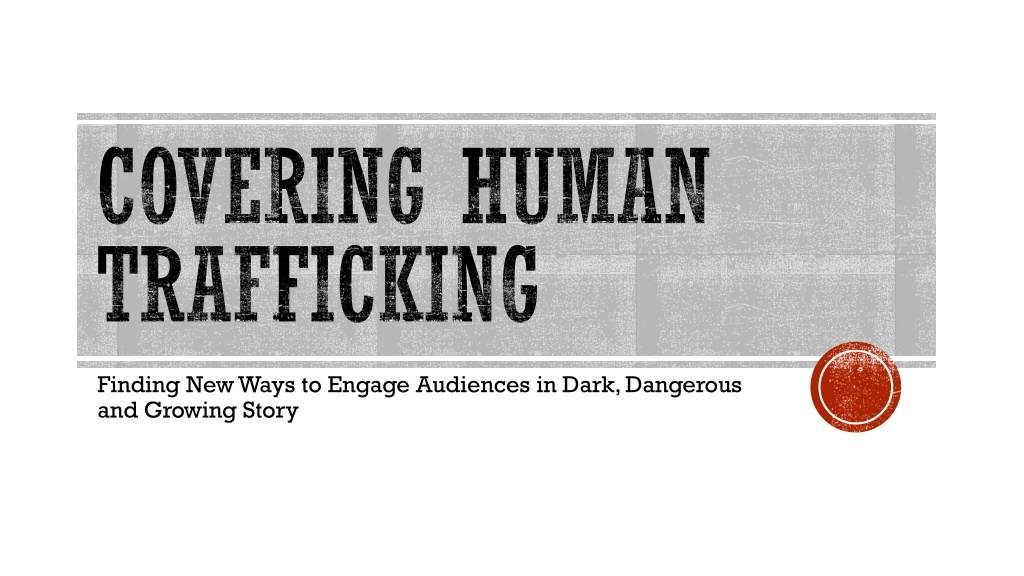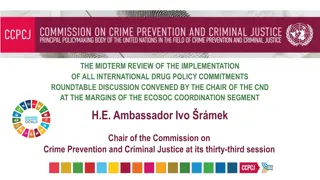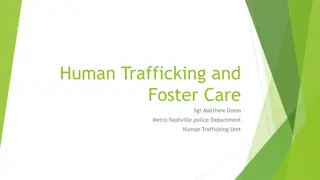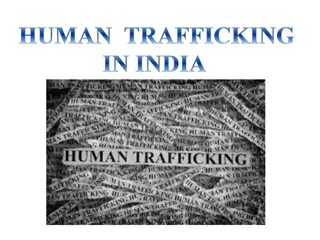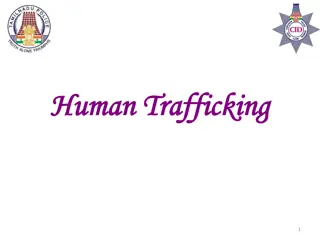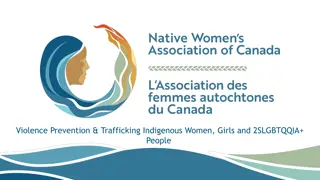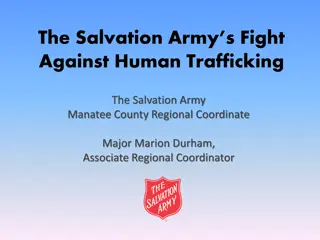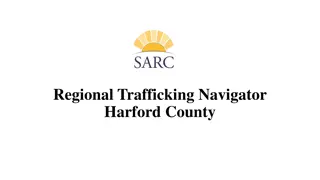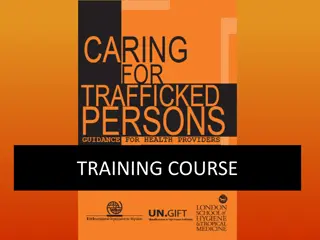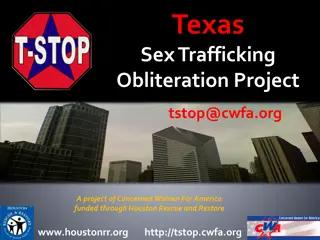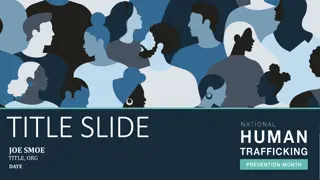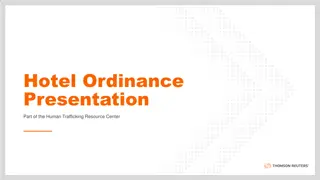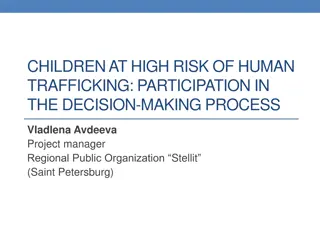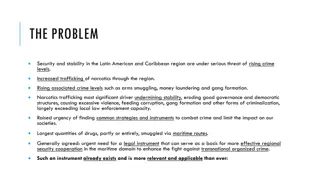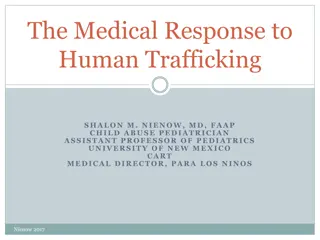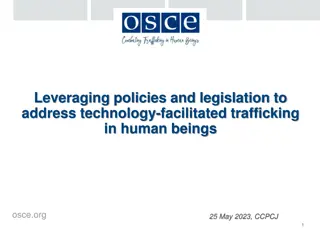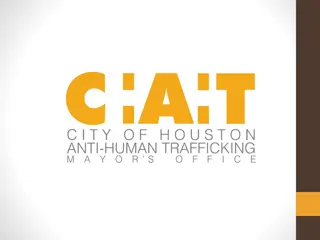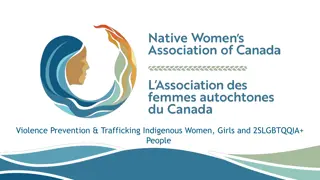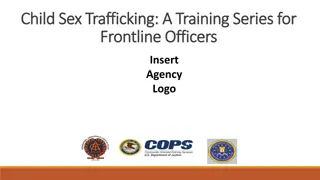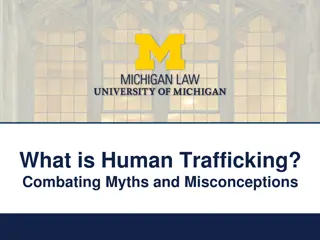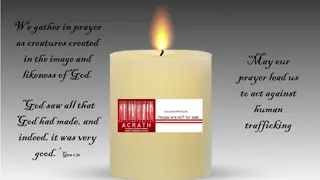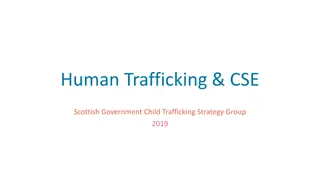Uncovering Human Trafficking: Challenges and Solutions
Sharon Ijasan shares her firsthand experiences on the challenges of reporting on human trafficking and highlights the need for government collaboration, justice for perpetrators, and safety for journalists in this dark and dangerous story. Lack of funds, awareness, and advocacy hinder efforts to combat this growing issue, but stories like Favour's shed light on the impact of investigative reporting. International conferences, accessible research materials, and continuous training are crucial in the fight against human trafficking.
- Human Trafficking
- Investigative Reporting
- Government Collaboration
- Justice for Perpetrators
- Journalists Safety
Download Presentation

Please find below an Image/Link to download the presentation.
The content on the website is provided AS IS for your information and personal use only. It may not be sold, licensed, or shared on other websites without obtaining consent from the author. Download presentation by click this link. If you encounter any issues during the download, it is possible that the publisher has removed the file from their server.
E N D
Presentation Transcript
COVERING HUMAN TRAFFICKING Finding New Ways to Engage Audiences in Dark, Dangerous and Growing Story
TABLE OF CONTENT Introduction The story The challenges The solutions Safety for journalists Conclusion
INTRODUCTION My name is Sharon Ijasan. First, I would like to thank the organisers of the AIJC2023 for giving me the platform to speak, even as my visa is yet to arrive from the South African Embassy in Nigeria. I also want to thank the moderator, who is a veteran journalist and a kind boss, for allowing me to share my experience on this critical issue, despite challenges.
THE STORY Human trafficking is a multi-billion dollar business. It s all around us in Africa and beyond. Africa also serves as a continent of source and destination. Political instability, militarism, civil unrest, internal armed conflicts and natural disasters may lead to an increase in trafficking rate. But from my experience on the field, the primary cause is POVERTY.
THE CHALLENGES The challenge of covering human trafficking, finding new ways to engage audiences in dark, dangerous and growing story is a big task. First and foremost, lack of funds is a big challenge. It s very expensive and dangerous task to tell trafficking story. In many countries, where citizens get trafficked, there is not much awareness, advocacy and campaign to either reduce the growing trend or end it. For the past 24 months, I tried to speak with survivors of human trafficking in Nigeria. In the course of this, I was able to reveal a trafficker in BANDA-KWANTA, Ghana, were a girl named Favour was trafficked to. As at the time I met her, she was 17 years old, trafficked by her mother to Ghana at age 14, pregnant and repatriated to Nigeria by IOM at 16 and a mother at 17. For me to uncover this trafficker that is still walking freely in the outskirts of Ghana, I had to spend my personal resource to be able to tell the story. The impact of that story as of now, is that Favour is in a home and she has resumed school (a sponsor came through after watching her story on the medium where I work in Nigeria, TVC NEWS.
SOLUTION There is the need for the government and the international community to collaborate more, towards achieving zero tolerance for human trafficking. There is the need for justice; perpetrators must be prosecuted. There are not many stories of perpetrators being punished or serving jail terms, due to crimes committed. From field experience, many of the victims also become traffickers themselves. The chain goes on and on. Training and retraining on the subject matter is also important. (Research materials should be easily accessible, resources persons should be easy to access e.t.c) * Conversations such as this at international conferences should be encouraged.
SAFETY FOR JOURNALISTS Though, there have been sessions on safety for journalists at this event, I would like to share the following; Say less, when you are on the field Follow your instinct Do not start a story that you do not have enough funds to tell or finish. Have a plan B Always share your location with your Editor. If you are a freelance journalist, ensure you have a trusted person back at home that you can share your live location with. Always dress for the type of story you are covering. (wear dark colors if possible) Always have a bottle of water with you. Never go out to a war zone without a boot or comfortable canvas.
CONCLUSION Please note. It s not a crime to migrate to any country. In our stories, we can encourage people to migrate the right way. No human deserves to be trafficked. After interacting with survivors, I realised that it's almost like a scar that can never heal. Thank you for your time. Name: Sharon Ijasan-Alake X: @sharonijreport1 LinkedIn: Sharon Ijasan Email: sharonijasan@gmail.com
